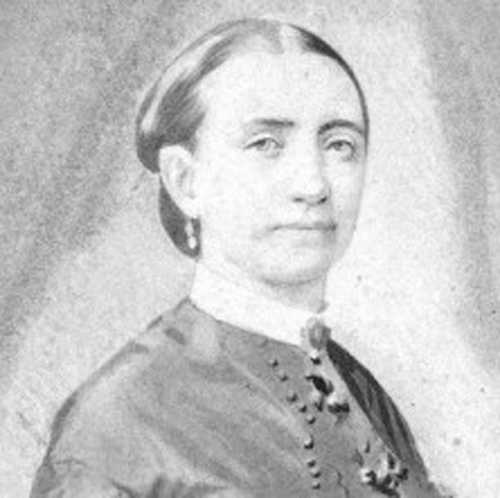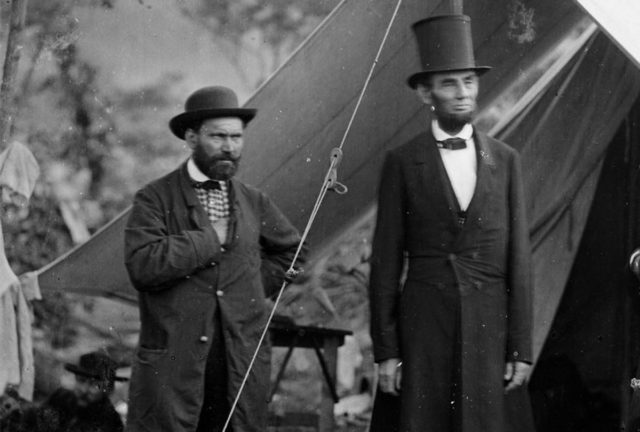“She succeeded far beyond my utmost expectations.”
Allan Pinkerton’s comment on Kate Warne
Although Lavinia Goodell and Kate Warne never met, in February of 1861 they shared a common interest: following the progress of Abraham Lincoln’s journey from Springfield, Illinois to Washington, D.C. On the afternoon of February 19, twenty-one year old Lavinia joined throngs of other New Yorkers to watch the president-elect’s carriage procession in mid-town Manhattan. (Read her account here.)
While Lavinia was in Manhattan, Kate Warne, who was approximately twenty-eight years old and was in charge of the famous Pinkerton Detective Agency’s Female Detective Force, was in Baltimore trying to ascertain if there were credible threats to Lincoln’s safety. It turned out that there were, and Kate helped thwart them.

Details about Kate Warne’s early life are scarce. An obituary published after her death and the narrative contained on the Find a Grave website indicate that she was born in Chemung County, New York circa 1833. According to Allan Pinkerton’s memoirs, he first encountered Kate in 1856 when she came to his Chicago office.

Pinkerton recalled:
I was seated one afternoon in my private office … when a lady was shown in. She was above the medium height, slender, graceful in her movements, and perfectly self-possessed in her manner…. She had a broad, honest face, which would cause one in distress instinctively to select her as a confidante, in whom to confide in time of sorrow, or from whom to seek consolation…. In a very pleasant tone she introduced herself as Mrs. Kate Warne, stating that she was a widow, and that she had come to inquire whether I would not employ her as a detective
(Although Kate may have introduced herself as a widow, Find a Grave lists her parents as Israel and Elizabeth Warne, and there is no mention of a spouse. Perhaps she believed that Pinkerton would think a widow more mature and dependable than a single woman.)
Pinkerton was taken aback at the request because female detectives were unheard of. When he asked what she thought she could do, “She replied that she could go and worm out secrets in many places to which it was impossible for male detectives to gain access.” Pinkerton said he needed some time to think about the matter and told Kate to come back the next day. When she returned, he hired her “and soon after gave a case into her charge. She succeeded far beyond my utmost expectations, and I soon found her an invaluable acquisition to my force.” Before long, Pinkerton hired other female detectives, with Kate in charge of the new hires.
In early 1861, the Pinkerton operatives learned about a plot to assassinate Lincoln on his way to his inaugural. The attack was to take place in Baltimore. Kate Warne was one of several agents sent to Baltimore to gain details about the operation. She went undercover as a Southern belle and was able to confirm key details. She then played an important role in helping insure that Lincoln, who was disguised as her invalid brother, had safe passage through Baltimore. (Kate Warne’s role in getting the president-elect to Washington, D.C. safely was portrayed in the three-part documentary Abraham Lincoln, which recently aired on the History Channel.
During the early years of the Civil War, Kate Warne worked for the Pinkerton agency in Washington, D.C. In 1863, she returned to Chicago with Pinkerton and in 1865 she assumed charge of female detectives in New Orleans.
Kate Warne died of pneumonia in January of 1868. She was approximately thirty-five years old. A lengthy obituary printed in the Chicago Republican called her “a most remarkable woman.” It went on to say:
She was undoubtedly the best female detective in America, if not in the world. Of firm convictions of duty, she was conscientious in the extreme in its performance. Though never associated with any religious denomination, she was just, charitable, and upright…. In her career while she lived she developed that her sex could do much more than had ever before been ascribed to their sphere. She leaves a void in the female detective department which it will be difficult ever to fill. As she lived, so she died, a strong, pure, devoted woman. Her remains lie in the private lot of Mr. Pinkerton in Graceland Cemetery [in Chicago].
Although Lavinia Goodell never met Kate Warne, it is safe to say that she would almost certainly have viewed Kate as a kindred spirit. Neither was content to remain in the conventional “sphere” assigned to women, and both broke new ground in opening professions that had previously been populated only by men to qualified people of both sexes.
Sources consulted: Allan Pinkerton, The Expressman and the Detective (W.B. Keen, Cook & Co., Chicago, Illinois 1874); Petula Dvorak, “The woman who helped protect Lincoln from the men who tried to kill him in 1861,” (Washington Post February 15, 2021); Kate Warne obituary in the Chicago Republican (February 1868); https://www.findagrave.com/memorial/6425/kate-warne.







